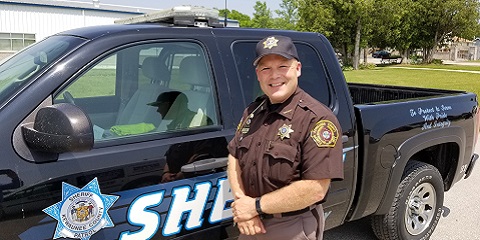“You’re not alone” has become a common refrain in communities trying to prevent suicides in recent years, but the events in Afghanistan may cause you to hear it more. Brown University published a study earlier this year that shows an estimated 30,177 active-duty personnel and veterans of the post-9/11 wars have died, which is four times more than the 7,057 that have died in battle during those efforts. As the country has pulled its operations out of Afghanistan, the United States Department of Veterans Affairs has seen an increase of people looking to use their mental health services. Kewaunee County Sheriff and Wisconsin National Guard member Matt Joski sympathizes with those that made the sacrifice and hopes people use the "Question, Persuade, and Refer" protocols for suicide prevention to reach out to people no matter their background who may be suffering.
Door County Veterans Service Officer Beth Wartella says there are resources available to veterans who are experiencing difficulties processing the events currently taking place in Afghanistan. We have that information along with Joski’s thoughts on suicide prevention efforts below.
FROM BETH WARTELLA
Our office is open Monday through Friday, 8am to 4:30pm.
Main Phone: (920)746-2226
Door County Mental Health Crisis Hotline: (920)746-2588 is available 24/7
Mental Health care is accessible at the Milo C. Huempfner VA Clinic:
2851 University Avenue
Green Bay, WI 54311
(920)431-2500
Green Bay Vet Center:
1600 S Ashland Avenue
Green Bay, WI 54304
(920)435-5650
FROM MATT JOSKI
It’s hard to believe that September is right around the corner, and with it all of the activities both in school as well as within our communities. One of the initiatives which we recognize in the month of September is Suicide Awareness Month. Recent statistics report that there 45,000 deaths annually attributed to suicide and that for every 1 documented death there are actually 25 attempts.
While there may be various reasons why people contemplate suicide as an option, some of the key circumstances in the State of Wisconsin are Diagnosed Mental Health Problem, Physical Health Problem, Recent Crisis, Financial Problem, Job Problem or Intimate Partner Problem. It is also important to note that suicide does not discriminate between genders, age or ethnic background. The one positive note is that suicide is one of the most preventable causes of death in our culture. This should give us great hope, but we as a culture need to be comfortable engaging with those who are feeling hopeless. Rather than responding to their cries by isolating them even further due to our discomfort with having an open discussion with them, we need to reach out and let them know they are not alone and they are in fact valued members of our families, and communities.
One reason that we are reluctant to reach out is the feeling that we are not mental health experts and that we may do more harm than good. This is not the case and there are now tools which can empower us to have these conversations not in an effort to diagnose, but to validate the feelings that our loved ones may be having and offering a message of hope.
The protocol that we have embraced here in Kewaunee County is titled. QPR (Question, Persuade, Refer) The first step in this process is just what is says, to actually confront the individual who may be exhibiting signs of suicide and asking the difficult question “Are you thinking about suicide?” Although many would think that this would do more harm than good just the opposite is found to be true. Typically those who are considering suicide are just waiting and hoping someone does actually intervene. This brings us back the statistic that for every 1 death by suicide there are 25 attempts, which are many times calls for help and not actions just looking for attention.
The second step is to persuade. This is where we need to take the time to stop whatever we or they are doing and have a meaningful conversation about all that is good in their lives and the many reasons they have to live rather than single reason they feel is bringing them to this decision. Again, we are not trying to diagnose them, but rather help them to find hope where all they see is hopelessness. One important key in this process is not to judge. Although we may view their crisis as minimal, to them it is crushing and trying to minimize it to them is not the answer.
The third step is to “Refer”. This where we get the professionals involved. What is key in this portion is the follow through. It does no good to show concern and then walk away once the referral is made. One of the biggest struggles for those in this state of mind is isolation. We must commit to standing by their side not just during the initial intervention but through the weeks and months that follow as they receive the professional help they need.
If you would like any additional information on this subject, or have an interest in a QPR presentation, please feel free to reach out to me. (920)255-1100






